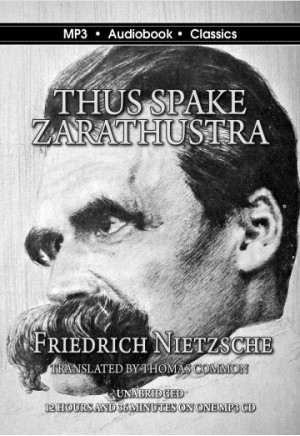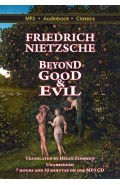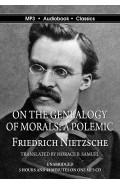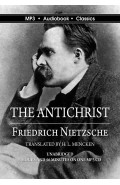| Track | Section | Length | Track | Section | Length | |
| 01 | Zarathustra's Prologue | 35:17 | 42 | Part 2: XLI. The Soothsayer | 9:55 | |
| 02 | Part 1: I. The Three Metamorphoses | 5:09 | 43 | Part 2: XLII. Redemption | 12:47 | |
| 03 | Part 1: II. The Academic Chairs of Virtue | 6:23 | 44 | Part 2: XLIII. Manly Prudence | 7:29 | |
| 04 | Part 1: III. Backworldsmen | 7:54 | 45 | Part 2: XLIV. The Stillest Hour | 9:16 | |
| 05 | Part 1: IV. The Despisers of the Body | 5:00 | 46 | Part 3: XLV. The Wanderer | 9:15 | |
| 06 | Part 1: V. Joys and Passions | 4:25 | 47 | Part 3: XLVI. The Vision and the Enigma | 14:01 | |
| 07 | Part 1: VI. The Pale Criminal | 4:39 | 48 | Part 3: XLVII. Involuntary Bliss | 8:23 | |
| 08 | Part 1: VII. Reading and Writing | 3:22 | 49 | Part 3: XLVIII. Before Sunrise | 7:48 | |
| 09 | Part 1: VIII. The Tree on the Hill | 5:25 | 50 | Part 3: XLIX. The Bedwarfing Virtue | 12:57 | |
| 10 | Part 1: IX. The Preachers of Death | 3:31 | 51 | Part 3: L. On the Olive-Mount | 7:47 | |
| 11 | Part 1: X. War and Warriors | 3:39 | 52 | Part 3: LI. On Passing-by | 7:22 | |
| 12 | Part 1: XI. The New Idol | 5:35 | 53 | Part 3: LI. On Passing-by | 12:27 | |
| 13 | Part 1: XII. The Flies in the Market-place | 6:00 | 54 | Part 3: LIII. The Return Home | 12:03 | |
| 14 | Part 1: XIII. Chastity | 2:31 | 55 | Part 3: LIV. The Three Evil Things | 15:06 | |
| 15 | Part 1: XIV. The Friend | 5:14 | 56 | Part 3: LV. The Spirit of Gravity | 10:44 | |
| 16 | Part 1: XV. The Thousand and One Goals | 5:11 | 57 | Part 3: LVI. Old and New Tables | 44:36:00 | |
| 17 | Part 1: XVI. Neighbour-Love | 4:17 | 58 | Part 3: LVII. The Convalescent | 16:14 | |
| 18 | Part 1: XVII. The Way of the Creating One | 7:01 | 59 | Part 3: LVIII. The Great Longing | 7:24 | |
| 19 | Part 1: XVIII. Old and Young Women | 5:49 | 60 | Part 3: LIX. The Second Dance-Song | 8:50 | |
| 20 | Part 1: XIX. The Bite of the Adder | 4:52 | 61 | Part 3: LX. The Seven Seals | 8:02 | |
| 21 | Part 1: XX. Child and Marriage | 4:10 | 62 | Part 4: LXI. The Honey Sacrifice | 11:32 | |
| 22 | Part 1: XXI. Voluntary Death | 7:23 | 63 | Part 4: LXII. The Cry of Distress | 9:48 | |
| 23 | Part 1: XXII. The Bestowing Virtue | 13:33 | 64 | Part 4: LXIII. Talk with the Kings | 10:19 | |
| 24 | Part 2: XXIII. The Child with the Mirror | 5:54 | 65 | Part 4: LXIV. The Leech | 9:20 | |
| 25 | Part 2: XXIV. In the Happy Isles | 6:32 | 66 | Part 4: LXV. The Magician | 14:38 | |
| 26 | Part 2: XXV. The Pitiful | 6:53 | 67 | Part 4: LXVI. Out of Service | 13:30 | |
| 27 | Part 2: XXVI. The Priests | 6:06 | 68 | Part 4: LXVII. The Ugliest Man | 14:39 | |
| 28 | Part 2: XXVII. The Virtuous | 7:22 | 69 | Part 4: LXVIII. The Voluntary Beggar | 13:46 | |
| 29 | Part 2: XXVIII. The Rabble | 6:28 | 70 | Part 4: LXIX. The Shadow | 9:56 | |
| 30 | Part 2: XXIX. The Tarantulas | 7:40 | 71 | Part 4: LXX. Noon-Tide | 8:56 | |
| 31 | Part 2: XXX. The Famous Wise Ones | 6:35 | 72 | Part 4: LXXI. The Greeting | 15:53 | |
| 32 | Part 2: XXXI. The Night-Song | 4:47 | 73 | Part 4: LXXII. The Supper | 6:42 | |
| 33 | Part 2: XXXII. The Dance-Song | 5:52 | 74 | Part 4: LXIII. The Higher Man | 26:15:00 | |
| 34 | Part 2: XXXIII. The Grave-Song | 7:36 | 75 | Part 4: LXXIV. The Song of Melancholy | 8:52 | |
| 35 | Part 2: XXXIV. Self-Surpassing | 8:05 | 76 | Part 4: LXXV. Science | 8:04 | |
| 36 | Part 2: XXXV. The Sublime Ones | 6:00 | 77 | Part 4: LXXVI. Among Daughters of the Desert | 10:04 | |
| 37 | Part 2: XXXVI. The Land of Culture | 6:06 | 78 | Part 4: LXXVII. The Awakening | 7:46 | |
| 38 | Part 2: XXXVII. Immaculate Perception | 6:29 | 79 | Part 4: LXXVIII. The Ass-Festival | 10:01 | |
| 39 | Part 2: XXXVIII. Scholars | 4:28 | 80 | Part 4: LXXIX. The Drunken Song | 20:21 | |
| 40 | Part 2: XXXIX. Poets | 7:19 | 81 | Part 4: LXXX. The Sign | 8:34 | |
| 41 | Part 2: XL. Great Events | 8:34 |
Production
Book Coordinator: Carl Manchester
Meta Coordinator: Carl Manchester
Proof Listener: Natalie M.
Artwork
Cover: Portrait of Friedrich Nietzsche 1899/1900 by Hans Olde
Inset: 19th century perception of Zoroaster derived from a figure that appears in a sculpture at Taq-e Bostan in south-western Iran.
Inset: The Faravahar or Frawahr, one of the symbols of Zoroastrianism
“God is Dead”. “The Superman”. The “will to power”. We’ve all heard the phrases, which are often used to represent concepts quite different from those first articulated by Nietzsche in Thus Spake Zarathustra. The most influential and famous of his books, the comic philosophic novel chronicles the imagined travels and speeches of Zarathustra, also known as Zoroaster, founder of the Persian religion Zoroastrianism, which is thought to be a precursor of Christianity. Nietzsche’s hero, however, is the opposite of the historical prophet. Here, the mission is to turn traditional morality upside down, to inform humanity that God is no more, that the meaning of life is to be found in the all powerful human life force represented by the Ubermensch, or Superman. The idea of “eternal recurrence”, which holds that events recur in an infinite cycle and is found in Indian philosophy and ancient Egypt, is a central theme of the work and stands in opposition to the linear concept of time in Christianity. In addition to its radical thinking, the book is also noteworthy for its unusual format and experimental style, which is full of wordplay, incorporates poetry and rhetoric, and, at times, mimics the styles of the New Testament and Platonic dialogs. Nietzsche said that "among my writings my Zarathustra stands to my mind by itself". Written in four distinct parts between 1883 and 1885, the first three parts were published individually and combined into a single volume in 1887. The fourth part was held back until incorporated in a new edition in 1892.
Nietzsche said that "among my writings my Zarathustra stands to my mind by itself". He stated that:
With [Thus Spoke Zarathustra] I have given mankind the greatest present that has ever been made to it so far. This book, with a voice bridging centuries, is not only the highest book there is, the book that is truly characterized by the air of the heights—the whole fact of man lies beneath it at a tremendous distance—it is also the deepest, born out of the innermost wealth of truth, an inexhaustible well to which no pail descends without coming up again filled with gold and goodness.
Play sample:
Download a PDF datasheet
| Item Info | |
| EAN - DVD case | 0701236969733 |
| EAN - CD jacket | 0682550992525 |
| Media | MP3 CD |
| Package | DVD box |
| Author | Friedrich Nietzsche (1844-1900) |
| Year | 1887 - Parts 1-2 1892 - Part 4 |
| Recording | |
| Read by | Multiple readers |
| Length | 12 hours and 36 minutes |
| Type of Reading | Collaborative |
Thus Spake Zarathustra
- Author: Friedrich Nietzsche
- Product Code: DB-1254
- Availability: In Stock
-
$11.99
Available Options
Related Products
Beyond Good and Evil
Beyond Good and Evil: Prelude to a Philosophy of the Future is the second of four seminal late perio..
$9.99
On the Genealogy of Morals
Friedrich Nietzsche set out to dig into “the origin of our moral prejudices” in On the Genealogy of ..
$9.99
The Antichrist
The German title of The Antichrist, Der Antst, translates into English as “The Anti-Christian” as we..
$9.99










